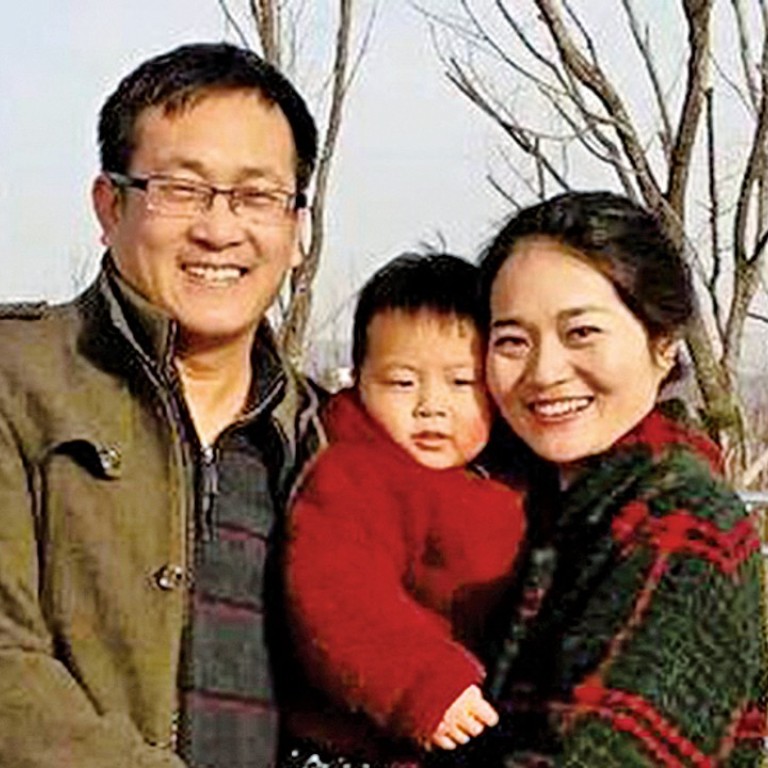
Wang Quanzhang: the last ‘709’ lawyer left in China’s legal limbo
Two years after a nationwide crackdown, an unbending advocate for some of the country’s most marginalised groups remains behind bars
Many of the dozens of people who stood outside a courthouse in Jingjiang, eastern China’s Jiangsu province, four years ago had never met the man they were demanding to be released.
But Wang Quanzhang’s reputation as an advocate for some of the country’s most marginalised groups united more than 50 people from across China in support of his cause.
Wang was ordered to serve 10 days in detention over a procedural dispute while defending a member of the outlawed Falun Gong religious sect but was released after three days amid public pressure.
“Many of the lawyers and civilians who were there to protest had not met Wang but they lined up at the entrance of the courthouse because it was a matter of public interest,” Shandong-based rights lawyer Li Jinxing said.
Four years later, Wang is behind bars again but this time the 41-year-old has languished for much longer – he is the last lawyer swept up in a 2015 crackdown to still be in custody.
There is no official explanation for why Wang is the only one of his peers from the “709 crackdown” to remain in legal limbo but friends and lawyers said it could be his unwillingness to bend on principle.
Wang began helping the underprivileged even before he graduated from law school. Born and raised in rural Shandong province, he began offering legal advice to Falun Gong practitioners and farmers fighting eviction while he was still a student at Shandong University in the late 1990s.
By the time he graduated in 2000, Wang had been warned off pursuing similar cases but he persisted and in the following years he was periodically detained, his home was searched, he was beaten up and he lost his job at a law firm.
Wang began gaining broader attention in 2010 when he investigated a case on behalf of the family of Cai Fuchen, a Falun Gong practitioner jailed in northeastern China’s Jilin province and rumoured to have been tortured to death.
A year later, he represented Shandong journalist Qi Chonghuai in an extortion case, and in 2012 he took on the case of Hong Maoxian, a leading petitioner from Henan province accused of obstruction of justice.
China Human Rights Lawyers Concern Group also said Wang sustained head injuries in 2014 when he refused to sign a letter denouncing lawyers being prosecuted in Jiansanjiang in Heilongjiang province.
Over the years, Wang represented some of the most hopeless causes – ones that few other lawyers were prepared to take on.
“The cases Quanzhang was involved in were so difficult that I couldn’t take on another after doing my first one,” Li said. “It is a special area where the law doesn’t work and yet he persisted and won respect in the field.”
Another Beijing-based lawyer said Wang was a man of compassion and righteousness.
“He acts according to his own conscience. To him, there is no grey between black and white,” he said.
But these encounters and others were only a prelude to the 709 crackdown, a massive campaign launched on July 9, 2015 that critics said was meant to silence China’s emerging rights defence movement.
About 300 lawyers and rights activists were caught in the net but Wang evaded the authorities until August 2 when police intercepted a message he sent to a friend, human rights advocate Michael Caster said.
Wang has since been charged with subversion of state power but has yet to face trial. He remains behind bars, unable to see the lawyers hired by his wife.
Over the past year, dozens of other lawyers and activists have been released on bail or given suspended sentences, outcomes that were the result of either pleading guilty or making a concession to the authorities, according to some of those who were released.
“The only reason Wang is still inside is because he will not give in, he won’t repent in exchange for release. This gives the authorities no room to work with in his case,” a freed 709 lawyer said.
It’s a view echoed by Wang’s wife, Li Wenzu.
She said Wang was the opposite of “the wise man who does not fight overwhelming odds”.
“He fights head on,” said Li Wenzu, who has petitioned every week for her husband’s release.
“Wang Quanzhang did not offer any compromise, not a single bit, which gives the authorities no means to prosecute him.
“It is devastating but all I can do is to support him, take care of our child and keep petitioning the judicial authorities every Friday for his release.”
Before the 709 crackdown and fearing he might be arrested, Wang wrote to his parents, saying it was not a reckless decision to become a human rights lawyer but a response to a call within.
“Such a rugged path is certainly covered with thorns,” he wrote.
“I have never given up on honesty, kindness and righteousness, the qualities my parents instilled. I have lived by these principles for years.
“Dear Father and Mother, please be proud of me. No matter how adverse the situation becomes, strive hard to live on until the sky clears one day.”

